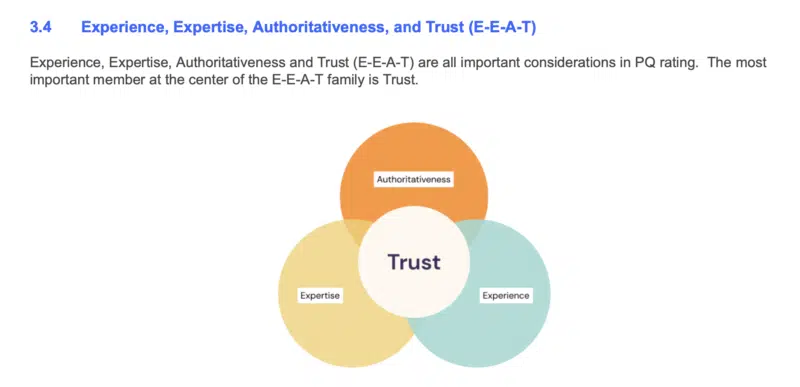In a follow up to our blog article in January last year (‘Understanding EAT When Optimising For Google’), we now take a look at how Google has recently added ‘experience’ to its previous search quality raters guidelines for expertise, authoritativeness and trustworthiness (E-A-T). This makes the new acronym E-E-A-T and so what does this mean as part of an SEO strategy?
Google says that the new ‘experience’ element is a new dimension of quality used to assess its search results. So now it checks if a website’s content “also demonstrates that it was produced with some degree of experience, such as with actual use of a product, having actually visited a place or communicating what a person experienced”.
Google explained that there are “some situations where really what you value most is content produced by someone who has first-hand, life experience on the topic at hand.”
Also, in the updated guidelines Experience, Expertise and Authoritativeness are important concepts that can support the assessment of trust, with trust being the most important part of E-E-A-T.
Here is the diagram Google created to illustrate this. (PQ stands for ‘Page Quality’ considerations):
Google says “trust is the most important member of the E-E-A-T family because untrustworthy pages have low E-E-A-T no matter how Experienced, Expert, or Authoritative they may seem.”
Experience differs from expertise because “pages that share first-hand life experience may be considered to have high E-E-A-T as long as the content is trustworthy, safe, and consistent with well-established expert consensus.”
Google describes when a page has low E-E-A-T then “the content creator lacks adequate experience, e.g. a restaurant review written by someone who has never eaten at the restaurant”.
You can view some other detailed revisions to the search quality raters guidelines or a more in-depth review of the changes.
Although search quality evaluators’ ratings do not directly impact rankings (as Google has clarified), they do provide feedback that helps Google improve its algorithms. So it’s important for SEO practitioners to spend some time looking at what Google changed in this updated version of the document and compare that to the previous version to see what more can be learnt about Google’s intent on what websites and web pages Google prefers to rank. Google made those additions, edits, and deletions for a good reason.
The additional dimension of “experience” is an important one that Google has been hinting at for a long time. It is nice to see it now documented as one of the four core aspects of defining quality that can change its latest algorithms.
If you want to know more about how the using E-E-A-T principles to improve your content and website perception can help your business, Or, if you have any questions about your website SEO and content, please contact us for a discussion.
Our experienced search engine marketing team will be happy to help!
